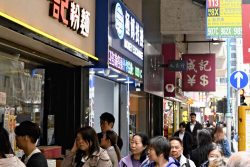
A shop clerk arranges items on a shelf at the 7-Eleven Hachioji Yorozuho store in Hachioji, Tokyo.
20:01 JST, December 9, 2020
One year has passed since Seven-Eleven Japan Co., the nation’s largest convenience store chain operator, put into high gear its review of blanket around-the-clock operations. The impetus for the review was a worsening shortage of manpower, which was also afflicting the food service industry. Not long after, the novel coronavirus started to spread.
Fast-forward to today. With people who lost their jobs due to the coronavirus crisis willing to fill positions at convenience stores, the manpower shortage and reductions of business hours have been pushed to the back burner.
Now individual store operators are paying attention to innovations in labor saving, but in anticipation that the manpower problem will reoccur once the virus outbreak is brought under control.
The 7-Eleven Hachioji Yorozucho store located in a residential area of Hachioji, Tokyo, was bustling with customers and fully staffed before noon in mid-November. Store owner, 72, said, “The manpower shortage has been resolved due to the increase in applications for part-time positions.”
In autumn of last year, Seven-Eleven Japan worked out guidelines for shorter late-night business hours, and accepted applications starting that November for eight selected stores. Other stores could apply later if they so desired.
The owner looked into the possibility of shorter business hours in late December last year. He did so because the store’s sales were only about ¥10,000 per hour in the wee hours and the store would be in the red after paying wages for part-timers.
The situations have changed recently. The number of applicants for late-night, part-time jobs has increased among those who were dismissed from izakaya Japanese-style pubs and other eating and drinking establishments amid the coronavirus pandemic, and university students for whom online lectures continued.
Convenience store operators have not changed their 24-hour operations in principle. The number of stores adopting shorter business hours has not increased because they concluded contracts that gave a bigger portion of profits to franchise shops that operated around the clock.
As of Dec. 1, only 800 7-Eleven stores have adopted shorter business hours. The number comes to about 1,000 if including those that adopted the shorter operations on an experimental basis and looked into the possibility of introducing the system. This accounts for less than 5% of the total number of 7-Eleven outlets.
In the case of Lawson franchise stores, the comparative number was held at about 350, or 2% of the total.
The review of around-the-clock operations was triggered when a franchisee in Osaka Prefecture began shortening hours without consent from the headquarters. The headquarters came around to permitting the shorter hours as complaints mounted that part-timers could not be secured due to the labor shortage, thus making it impossible for owners and managers to take days off.
■ Slim progress in unstaffed stores
As the virus outbreak drags on, convenience stores are still facing an uphill battle. Nationwide, convenience store sales in October dropped 4.3% from the same month a year earlier, logging a year-on-year decline for the eighth straight month. But now sales at outlets in residential areas are brisk, while those in business districts and tourist spots have turned downward.
Individual franchisees, anticipating a return of the labor shortage down the road are setting their sights on ways to ensure profitability. These operators have been stepping up investments to help finance labor-saving efforts for their stores.
Self-checkout systems, in which customers scan bar codes by themselves and pay by credit card or e-money is seen as one way to reduce the risk of virus infections. Since employees are handling neither the goods, nor the money at the register, customers can avoid contact with them.
Lawson Inc. last year tested an unmanned late-night operation at one of its outlets in Yokohama. The doors were effectively locked except for customers using a smartphone app to enter, shop and pay electronically. But the unmanned operation stopped short of being fully adopted because alcohol and tobacco cannot be sold without age verification, which must be done by a clerk.
While it is essential to continue steady efforts toward labor-saving systems such as the self-checkout, an executive of a major convenience store said that “a manpower shortage will occur again, so it will be necessary to work out measures with our sights set on the future.”
An analyst said: “Making labor-saving investments alone will be not enough as a measure to deal with the labor shortage that will come after virus infections are put under control. The franchise headquarters should establish a system under which voices of franchise stores calling for shorter business hours can be better reflected in the management of convenience stores.”
■ Effects on restaurant industry
Moves to reexamine 24-hour operations were seen at restaurant chains well ahead of other establishments, because they were asked to voluntarily restrict late-night operations as the first wave of the virus outbreak hit last spring.
The shortage of manpower had already been more serious at restaurant chains, which have more employees than convenience stores. The cutbacks in late-night operations amid the calls for voluntary restraint on going out led the trend of shorter business hours to take root.
Skylark Holdings Co. began 24-hour operations in 1972, setting a precedent in the family restaurant industry. This was in response to demand from customers who, after working late into the night, wanted to enjoy a proper meal. By the peak in 2009, more than 700 restaurants were open around the clock.
Facing a steady decline in late-night revenue due to several factors, Skylark had abolished 24-hour services by this spring. One element behind this is the increased availability of boxed lunches and side dishes at convenience stores to eat at home.
When the state of emergency was announced in April, Skylark group restaurants shortened business hours and strengthened their lineups of meals for takeout, like other family restaurants. About 2,800 restaurants in its group, including Gusto and Jonathan, will reduce business hours during the forthcoming year-end and New Year holidays, as well.
A Skylark official in charge said: “Due to the ongoing virus outbreak, the period of busy hours has moved to the daytime. If late-night operations are reduced, it will improve profitability.”
McDonald’s Holdings Japan, whose sales have been robust amid the coronavirus crisis, discontinued 24-hour operations at about 50 of its outlets between late last year and September this year. The company is considering focusing on its own home deliveries and other services, and will likely work toward strengthening its outlets’ daytime services, when many customers can be expected to come.
Top Articles in Business
-

Prudential Life Insurance Plans to Fully Compensate for Damages Caused by Fraudulent Actions Without Waiting for Third-Party Committee Review
-

Narita Airport, Startup in Japan Demonstrate Machine to Compress Clothes for Tourists to Prevent People from Abandoning Suitcases
-

Asics Opens Factory for Onitsuka Tiger Brand in Western Japan
-

JR Tokai, Shizuoka Pref. Agree on Water Resources for Maglev Train Construction
-

KDDI Opens AI Data Center at Former Sharp Plant in Osaka Prefecture; Facility Will Provide Google’s Gemini AI Model for Domestic Users
JN ACCESS RANKING
-

Japan Institute to Use Domestic Commercial Optical Lattice Clock to Set Japan Standard Time
-

Israeli Ambassador to Japan Speaks about Japan’s Role in the Reconstruction of Gaza
-

Man Infected with Measles May Have Come in Contact with Many People in Tokyo, Went to Store, Restaurant Around When Symptoms Emerged
-

China Eyes Rare Earth Foothold in Malaysia to Maintain Dominance, Counter Japan, U.S.
-

Prudential Life Insurance Plans to Fully Compensate for Damages Caused by Fraudulent Actions Without Waiting for Third-Party Committee Review
























